Rachel Cuschieri was the first Maltese female footballer to land a professional contract back in 2014, with Apollon Limassol, but that was just the beginning. Having already tasted silverware with Birkirkara, Cuschieri went on to achieve titles with the Cypriot team, RSC Anderlecht & Lazio.
With experience also in the Netherlands with PSV, at the time when the Dutch were setting the standards in European women’s football, as well as more recently with Italian outfit U.C. Sampdoria, Cuschieri’s insight shows the extremes that professional women’s football can offer to this day.
Along the way, Cuschieri donned the Maltese shirt with the desire to reach highs with her nation as well. She most recently topped the global assist charts of the inaugural UEFA Women’s Nations League, contributing to Malta’s historic promotion last December, before the team embarked on this UEFA Women’s EURO Qualification cycle.
Sharp in her football and in her words, Cuschieri provided a picture of the realities of professional women’s football, dealing with being the first professional in the Malta’s Women’s National Team at such a young age, the growth along the way and the road ahead.
Beginnings & Taking A Leap of Faith
ES: Walk me through your beginnings in football and debuting in the UEFA Women’s Champions League with Birkirkara…
RC: I started with San Gwann boys at the age of five, which is my hometown. I played with them until I was thirteen because that was the age limit at the time for girls to play mixed with boys. I was the only girl playing with them, I think at the time I thought I was the only girl playing football in Malta. I didn’t know women’s football was a thing.
Then as I turned thirteen and the age limited me from staying with San Gwann Boys, Debbie Pisani, who was from San Gwann and playing with Birkirkara, introduced me to Birkirkara’s women’s team. I remember I was not very happy initially, because the game was completely different to what I was used to, in terms of the level, speed and aggressiveness. Add to it that I was thirteen and probably a bit full of myself if I’m honest, I had some growing up to do. However, with time you become part of the team, you start playing for each other and I stayed there for eight years so I grew a lot in that time.
So, with Birkirkara we did well as a team, I had my first taste of UEFA Women’s Champions League and scored my first goal in the competition. Since then, of course the team has gone forward to even win matches in the competition, which is great to see.
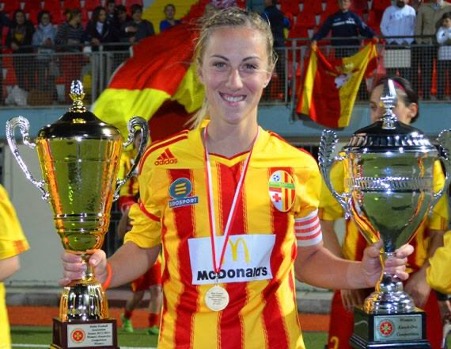
By the age of twenty, Cuschieri had been racking up the goals and assists with Birkirkara, which also earned her the individual accolades of MFA Player of the Year in 2011 and 2012.
ES: You made the leap to go to Apollon in 2014, becoming the first Maltese female footballer to land a professional contract. How did that come about and what was going through your head as you attempted to make this decision?
RC: I always wanted to move abroad, and I had done a trial with Bayern Munich trial three years prior, which was a big experience but in a sense also showed the huge differences in the intensity of training. Then we had the Aphrodite Cup, we were playing against Cyprus and my performance with the national team caught their eyes I guess. Apollon asked but I refused the first time. I think I thought it was similar to Malta in level, based on the matches against the national team and the fact that it was another small island, as opposed to big countries like Germany or England. In addition to that there was also the language barrier which I would have to get over as well. So, I think I was not ready for that either.
However, we played the Aphrodite Cup again and they came back a year later. At the time I started to shift my mentality in the sense of maybe the league level was not among the top in the world, but as a team they were competing regularly in the UEFA Women’s Champions League and they were investing in a lot of foreigners, so the level was improving. They had brought in players who played with the USA Women’s National team, and I said yes, which is when my career as a professional footballer took off.
ES: How did you adapt on the pitch, but also away from it?
RC: I was getting regular starts which was important because it gave me confidence in my ability to play football at that level. Obviously, coming from Malta and seeing these teammates who were coming from these big countries, who were leaders in international women’s football, was very different and could be daunting at times. So, the fact I was getting picked in the first eleven regularly was very important.
It was a shift for me, because suddenly my routine changed into going to training and going home. Up to this point I had always played in Malta, which meant I juggled football alongside working in catering, which had very long hours. I did not mind it, but once I joined Apollon football became my full-time job, which was freeing because I could focus on doing the thing that I loved.
On the other hand, of course it pushes you to grow because you have to learn to become independent, to take care of yourself and pay for rent, as well as to adapt to different a culture. The first year you go abroad is very hard, you can become very homesick, you miss your family and as a footballer away from home you’re missing big family moments. With the second year you’ve gotten so used to the independence that then it’s the other way around, but the first year is hard for sure.
ES: What were the differences between the leagues in terms of style of play that you had to adapt to?
RC: Well, in Malta I had gotten used to being given the ball and dribbling my way up the pitch. I had sort of gotten used to that responsibility. In Cyprus, the game was quicker and the level was higher which meant that you had to rotate the ball more as a team and that opened my mind more to the movements in the game.
Navigating Different Leagues
Rachel Cuschieri spent three seasons with the Cypriot team, lifting the Women’s Cup and the League along the way. With the team, Cuschieri also achieved the Round of 32 stage in the UEFA Women’s Champions League, scoring five goals for the outfit. Along the way, she also became the Maltese record-holder for most goals (6) in the UEFA Women’s Champions League (UWCL).
ES: What prompted the change from Apollon to Anderlecht?
RC: I had options to join other teams along the way but I was happy there and I am very fond of that time because they had a very important role in shaping the player I am today. It was very hard to leave that club, because it had really become my home. However, then as that last year elapsed, it felt like it was the time to make another step as a player.
ES: Transfers in women’s football have evolved a lot since then, but at that time were there any key people guiding you in these steps?
RC: At the time when I was still with Birkirkara, there were no agents and maybe I would have gone earlier had there been something like this. I was navigating things on my own. I always wanted to go abroad, because I never looked at football as a hobby, but getting that first door opened was difficult and really I would say it’s only thanks to the national team which I did.
Things changed with time. In my third year with Apollon I met an agent, Leoni, and she had started this agency called ‘Flowsports’, which at the time was a small agency. She started from nothing, had a lot of Dutch players (she’s also Dutch) and had taken me on board after seeing me play for Apollon.
It was different then because all players were signed through trials really, today there’s a bigger tendency of players getting signed based on clips or data. Having a good agent is crucial either way. I had done a trial in Norway but I did not like the style of play, which was very direct, and didn’t really complement my strengths as a technical player. Additionally, given I’m from Malta, I didn’t like playing indoor football because of the weather. However, then I did a trial with Anderlecht and when the offer came from them, I didn’t really have to think twice.
FlowSports agency has since grown into one of the top agencies in women’s football, with a portfolio of talents including the likes of Vivianne Miedema, Jill Roord and Daphne van Domselaar, among many others.
ES: How would you describe your time with Anderlecht?
RC: It was a time when the team had not yet won the Belgian Super League and we managed to win it in my first season there. I unfortunately sustained a very serious injury in the latter part of the season, but was proud to have been very much a part of the team early on in those first six months, so winning it with them was very rewarding because despite the injury I felt my contributions up to that point were really substantial.
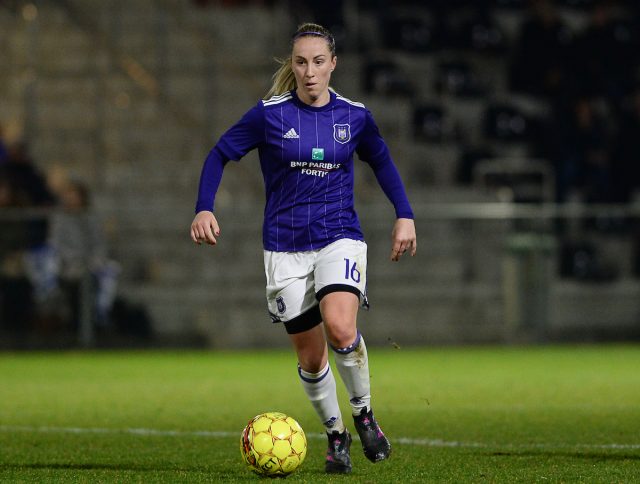
Rachel Cuschieri was playing for Anderlecht during the 2017/18 season, before switching to PSV between 2018 and 2020. This was at the height of women’s football in the Netherlands, shortly after the team won the UEFA Women’s EURO.
ES: How would you describe the setups at Anderlecht & PSV considering that these countries were among the leaders in women’s football?
RC: Anderlecht was very good, we trained where the men trained in terms of the facility. The pitch was synthetic which was not ideal, but we were training at the main facility. They organized training camps abroad, in Spain for example, to play friendlies against teams like Valencia. This was a new level for me to experience when compared to Birkirkara or Apollon.
Then when I went to PSV it was another level, because in the Netherlands they take the development of players very seriously, down to grassroots, and for both boys and girls. So, suddenly we had ten grass pitches and our own dressing room. Things have improved further since, and the women’s team have their own section I believe today. However, at PSV I would say I experienced the highest level in terms of setup and facilities. It truly felt professional in every sense. We had double sessions, with lunch coordinated according to our needs as players. It felt like a luxury in a sense, but at the same time it is the setup that leads to the top level required.
We were very together as a team, watched games together, ate together and it was a really great place to be. At PSV events were organized for the men’s and women’s teams together and we even attended charity drives together. It was a club that truly made you feel equal and part of something professional in every sense.
The club also took me in following a serious injury, which is not common to find and I will always be grateful for their support to rehabilitate. I sustained another injury mid-way through the second season and although I came back ready, Covid came around shortly after and that challenged every club as well. I went to Lazio then, though I would have loved to stay longer at PSV.
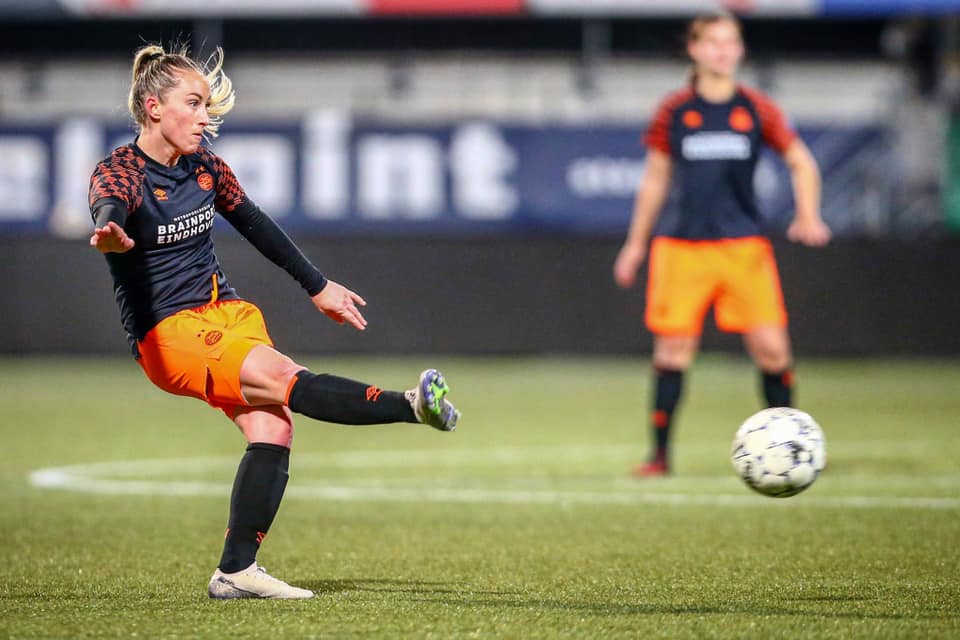
ES: Following this you spent the last four years in Italy with Lazio & Sampdoria. What was that like, when comparing things to life at PSV and Anderlecht?
RC: The first six months at Lazio were very difficult for me emotionally. I had to go into Serie B (whereas up to now I had only been in top-flight football) and the facilities were very poor originally, so it was a big shock from what I had gotten used to. Things improved in the second half of the season when Carolina Morace came in. She moved us to the men’s facilities, so we were now training on grass instead of synthetic and in better facilities, so things improved also emotionally and it started to feel professional again. The results improved as well and we went on to earn promotion into Serie A.
At Sampdoria, things started well in the first season, but the club started to struggle financially halfway through the season and we were getting paid late. On top of this we were fighting against relegation and ultimately managed to stay in Serie A on the final day against Pomigliano. There was a nice satisfaction to achieve that despite all the troubles going on both on and off the pitch.
However, then I remember going back from the summer break for pre-season and it never materialized. There was the ownership transition and financially there were issues, with the club deciding to pull the women’s sector. As players we sought support and ultimately penned the open letter, following which things changed and we started pre-season two-three weeks before the start of Serie A.
Despite these hurdles the team secured an impressive tally to confirm their place in Serie A early on last season and also snatch the biggest victory on record for the club.
ES: Considering the hurdles both on and off the pitch, how would you describe your last season and what would you say were the key ingredients to that success?
RC: As a team we understood the struggle, we had a difficult start, but we were determined to fight. We still had issues financially, but on the pitch, I thought we were doing very well. Personally, it was a very good season for me on the pitch. It started out very bad, but it ended very good. Despite all the hurdles with the club, we had a very good team environment as players and it really felt like a family where we were pulling the same rope. We gave a response to anyone who didn’t believe in us, and I always felt we held respect from other teams to compete this season.
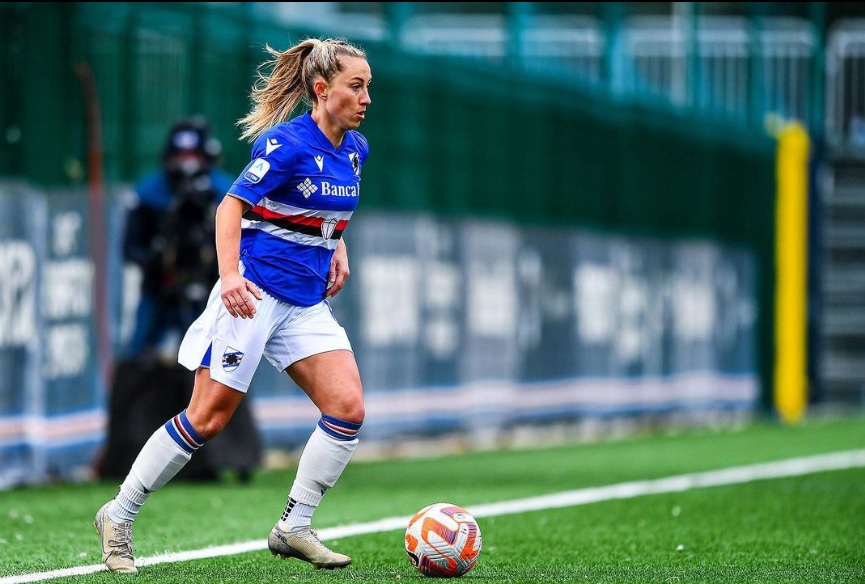
Rachel Cuschieri forms part of the Common Goal initiative, which, spearheaded by Juan Mata, brings together several members of the football community to contribute back to society by pushing towards a sustainable and equitable future.
ES: What prompted you to become an ambassador for Common Goal and why is this organization important?
RC: They had contacted me when I was with Lazio and I was interested in it because ultimately sport can help someone to escape from bad environments and build a better future. So, I’m happy to contribute to something that is dedicated to improving things for those who are not so lucky and it is an organization that truly delivers on the promise of change. There’s a lot of players who are contributing, with Juan Mata being one of the leaders, and now there are several players involved like Vivianne Miedema and more. It’s a great initiative and I’m proud to be a part of this.
Representing Malta
Rachel Cuschieri has grown into one of the veterans of the Malta Women’s National Team. Most recently, she grabbed the most assists in the inaugural UEFA Women’s Nations League, as Malta secured promotion to League B. She since captained the team for the first time in the Visit Malta Tournament, before the nation embarked on their debut in League B for the UEFA Women’s EURO Qualification cycle that will culminate next week.
ES: In the time that you’ve played with the national team, would you say that this last year was the most enjoyable on the pitch in terms of the football itself?
RC: Yes, I think I’ve enjoyed it more since coach Manuela Tesse came into the setup for sure. It’s always an honour to play for your country, but from a footballing perspective I felt we were maybe stagnating before she came. I think she’s done an incredible job in pushing the team forward and also injecting a belief that we can challenge top teams and bring home results.
I think it showed on the pitch and it allowed me to express my game more going forward. Last year I delivered a lot of assists at both club and national team level, which was of great satisfaction as a player, especially considering the injuries I had before. Although maybe when I was younger I was the one scoring goals with the national team, now we have plenty of talent up front so in a sense my role has shifted to create. I enjoy it and for me there is great satisfaction in delivering that assist.
ES: Looking at the recent achievements, how would you say the national team has evolved over time, including your role in it?
RC: Well, I think looking back there was a time when perhaps there were only a handful of players who the team looked to, to make a difference. There were of course players like Dorianne Theuma, Rebecca D’Agostino and a few others. However, today the team has grown a lot and there are many who can make the difference. Up front we have a lot of talented young players, there’s more players creating in midfield and the defence has also become a lot stronger with leaders across it.
As a country, from a global standpoint in football, we had this narrative of losing most games. Specific to the Women’s National Team, I think in the past we won the games that we would be expected to win against the lower teams but had not gotten to the point of winning matches against better opponents and truly challenging. We are seeing this on the pitch now, where the narrative is changing. Before, no one would think that Malta could draw against Northern Ireland, but we managed that as a team.
I think what coach Manuela (Tesse) has brought is firstly that change in the mentality of the team, the belief that we can get results, whereas before we had a defensive mentality, of avoiding defeat. We are now more balanced in the way we approach a match in terms of defense and attack, which is important if you want to win matches and push forward. However, it is not only Malta that has improved, but other nations too.
ES: As the first player to be playing professional football, did you feel an added weight in expectation just because of your professional status, when playing for Malta?
RC: I think in a sense having been the first Maltese woman player to go abroad professionally, I knew I had a certain responsibility. Looking back, I think the first time back with the national camp after going abroad I needed to check my ego a bit, but today as a thirty-two-year-old I think in a sense you cannot blame a twenty-one-year-old for being immature. However, I was keen on sharing my experience to help my teammates get better. At the same time, I know that I can be demanding and blunt in delivering comments. With time I understood more how to approach these things, while many grew to understand my character a bit more I think as well.
On the flip side, at times I did feel there was that expectation that, just because I played abroad, a mistake was more scrutinized. However, starting to play professionally does not make you infallible. The biggest players in the world also make mistakes. Looking back there were times when certain comments were passed by different members, not just players, that were outright disrespectful, and it affected me. At times I addressed this directly with the person, but in other times it caused me to detach.
ES: As a player you are now one of the veterans and certainly one of the leaders on the pitch, including with crucial contributions in the UEFA Women’s Nations League, as well as standing in for Emma Lipman as captain of Malta for the first time in the Visit Malta Tournament. How have you embraced that leadership role over time?
RC: I think growing up as player you always dream of captaining the national team. I’ve matured with time and became calmer as well in a sense. I can still be intense on the pitch and demanding, I’m sure my teammates will attest to this. However, in a sense sometimes this is necessary as well to focus the team, as long as it’s controlled.
However, I’ve learned more how to approach this with time. I’ve also understood that it’s also what you do. For example, against Latvia when we conceded the goal, something flipped in me and I was pushing forward, trusting that the team will follow. There were vocal players like Emma Lipman and Charlene Zammit communicating positively from defence as well. Ultimately, I’m proud to have delivered the assists for the goals to be scored so that we secured the promotion. The team combined perfectly, with everyone pulling their weight to get that.
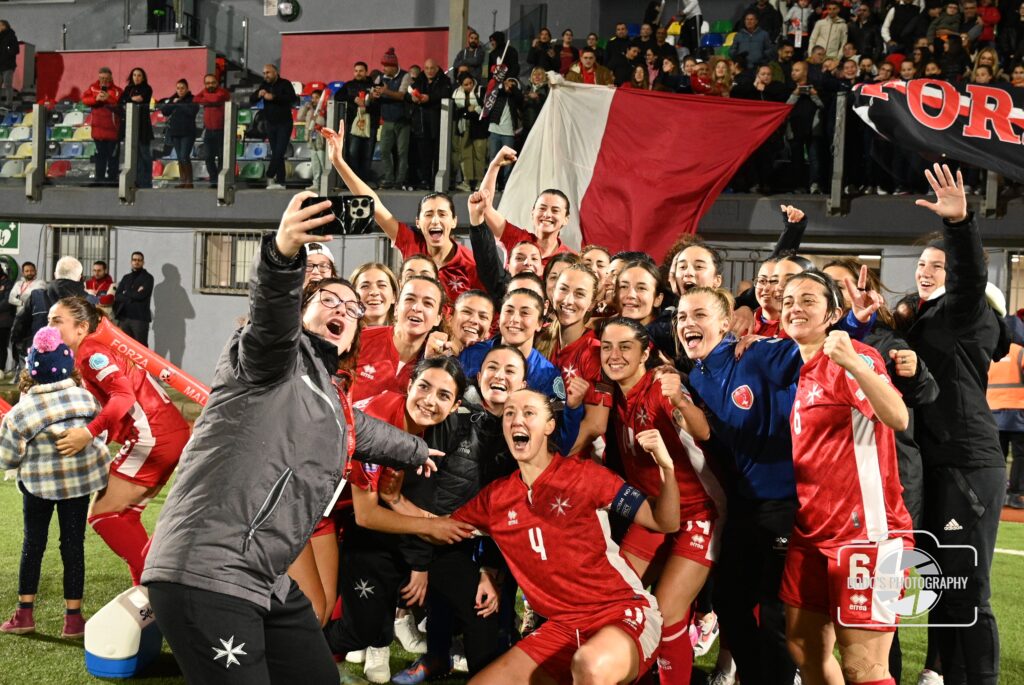
ES: As someone who has played abroad for so long and seen structures of such a professional level in the clubs you’ve played in, have there been times where you questioned the setups in Malta and what aspects would you consider crucial to invest in?
RC: I think the recent results show that as a national team we’re going forward, but there’s always that feeling that we are going forward at a much slower pace than other countries are around us. That means that you end up yo-yoing between up and down, which means that eventually you get left behind, as others progress much quicker.
As I’ve said there’s been improvement in the technical setup, we have more staff around us, however there’s still a big gap. If you’re not training with the basic elements in place, then you cannot perform at the proper level. I’m aware there’s efforts to improve facilities and this must be top priority. At national team level you expect to have the most professional setup, this includes having the right equipment for recovery and a proper gym setup for top fitness.
This is a long-term investment and ultimately Malta’s national teams would reap the benefits because the players will be in much better condition. Of course, I realise that there’s plenty of costs involved, but there’s a lot of funding being provided by different entities. I hope these gaps will be addressed in the near future.
ES: Looking at these upcoming two matches, both will be played in hot Mediterranean conditions in a July break which is rare. You were very close to points against Bosnia, and earned a point against Northern Ireland, so what is your mentality as you go into these matches?
RC: We could have done better against Bosnia & Herzegovina, we did not get the job done, so we are looking to make amends. It’s not going to be easy against two nations who have professional teams. We’ve been putting in the effort to train as professionally as possible, but still there are several of us who are still juggling full time jobs separate to football, as well as everyone obviously dealing with their own personal matters as well. It’s not easy and I’m sure several of us are mentally tired.
However, I’m sure that the team will want to put on a good performance at home against Northern Ireland, despite knowing that they are a great team. We got a draw away from home, so we need to have that same mentality and level. Portugal is of course on another level, the players are ones you are in awe of, and we’ll be playing in their home. I’m sure it will be very difficult, but we must go into the matches determined to give these teams a tough time and try to get a result.
Quick-Fire Questions:
- Score or Assist – Assist
- Best strength as a player – Vision
- Most underrated attribute about you as a player – Defending
- Biggest prankster you’ve played with – Veronique Mifsud
- A place you would suggest visiting from the ones you’ve played in – Genoa
- Career if you were not a football player – Probably have my own business
- Best highlight of your football career so far – Historic Promotion to League B with the national team. Club-wise winning titles with Apollon, Anderlecht & Lazio were all great, but I would say that probably avoiding relegation with Sampdoria, considering everything that we were going through, is the real highlight.
- A player you wish you could have played with for longer? – Agnese Bonfantini
- A player you enjoyed sharing the pitch with – Elisabetta Oliviero
- Best team you’ve faced thus far – AS Roma
- Best coach you’ve had so far – Manuela Tesse
- Goals for upcoming year – I’m proud of what I’ve achieved but the goal remains to keep improving as a player for as long as I can, keeping making my family proud as a player and sustain the level as the women’s game grows.
Rachel Cuschieri forms part of the twenty-five player squad selected to play the final round of matches in the UEFA Women’s Qualification Group Stage matches.
The team will play their final home match against Northern Ireland this Friday 12th July at the Centenary Stadium, KO 19:30. Tickets are available for purchase online. The final match will be played on the 16th July at 19:00, against Portugal at the Municipal Stadium of Leiria.
Lead Image: Brandon Bonett
Stay up to date by following The Sporting Fan on social media: Instagram ~ Facebook ~ X
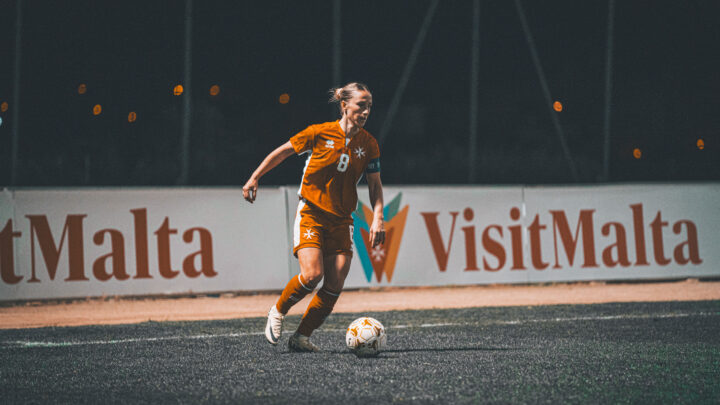
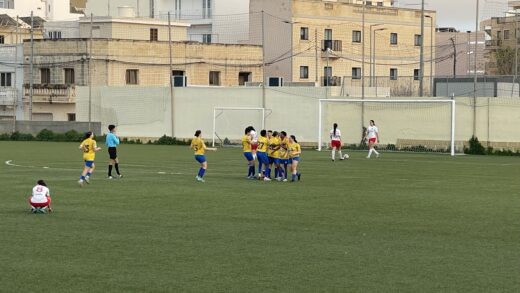
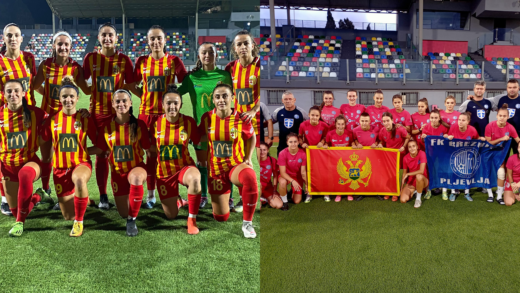
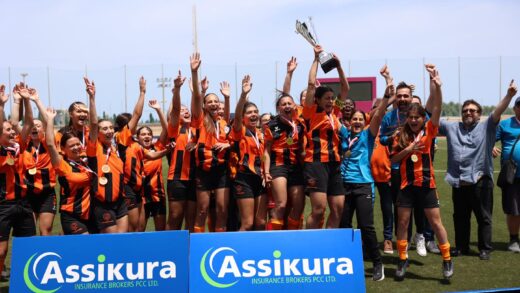
3 Responses
[…] Spotlight: Rachel Cuschieri […]
[…] Spotlight: Rachel Cuschieri […]
[…] Spotlight: Rachel Cuschieri […]